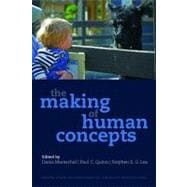
Note: Supplemental materials are not guaranteed with Rental or Used book purchases.
Purchase Benefits
Looking to rent a book? Rent The Making of Human Concepts [ISBN: 9780199549221] for the semester, quarter, and short term or search our site for other textbooks by Mareschal, Denis; Quinn, Paul C.; Lea, Stephen E. G.. Renting a textbook can save you up to 90% from the cost of buying.
| List of contributors | p. xi |
| Theoretical foundations | |
| Where do concepts come from? | p. 3 |
| What are categories and concepts? | p. 11 |
| Rules and similarity in adult concept learning | p. 29 |
| Mechanistic models of associative and rule-based category learning | p. 53 |
| The neurobiology of categorization | p. 75 |
| Different kinds of concepts and different kinds of words: What words do for human cognition | p. 99 |
| Concepts and culture | p. 131 |
| Concept learning across species | |
| Category learning and concept learning in birds | p. 151 |
| Concept learning in nonprimate mammals: In search of evidence | p. 173 |
| Concepts in monkeys | p. 201 |
| Cognitive development in chimpanzees: A trade-off between memory and abstraction? | p. 227 |
| Categorization and concept formation in human infants | p. 245 |
| The making of an abstract concept: Natural number | p. 265 |
| Concepts in human adults | p. 295 |
| The making of uniquely human concepts | |
| Darwin and development: Why ontogeny does not recapitulate phylogeny for human concepts | p. 317 |
| More than concepts: How multiple integrations make human intelligence | p. 335 |
| The evolution of concepts: A timely look | p. 365 |
| Conclusions | |
| The making of human concepts: A final look | p. 387 |
| Index | p. 395 |
| Table of Contents provided by Ingram. All Rights Reserved. |
The New copy of this book will include any supplemental materials advertised. Please check the title of the book to determine if it should include any access cards, study guides, lab manuals, CDs, etc.
The Used, Rental and eBook copies of this book are not guaranteed to include any supplemental materials. Typically, only the book itself is included. This is true even if the title states it includes any access cards, study guides, lab manuals, CDs, etc.